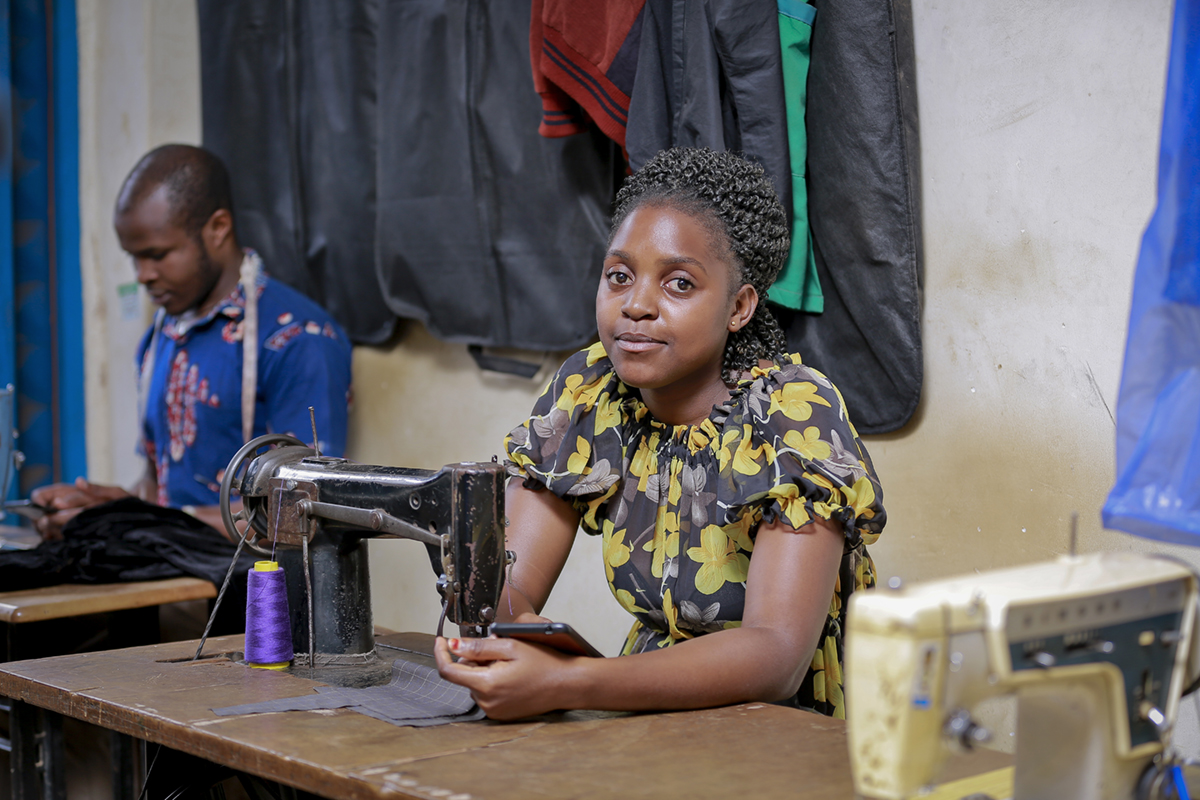A basic account is a secure entry point for previously unbanked people to become more resilient. It also opens a wealth of opportunities – for investing in education, or growing their businesses.
Programme background
A six-year partnership with the Mastercard Foundation and WSBI, Scale2Save is a programme to establish the viability of low–balance savings accounts and to understand the extent to which savings allow vulnerable people to boost their financial resilience and wellbeing. The programme’s work is anchored by developing viable business models with a broad mix of financial service providers that create high-usage cases that widen financial inclusion. This occurs by improving the quality of savings, alternative distribution channels and the financial service offer in general. Scale2Save balances project work with research conducted and shared among partner banks and the wider sector.
Scale2Save in a nutshell
Between 2016 and 2022, Scale2Save financially included more than 1.3 million women, young people and farmers in Kenya, Uganda, Nigeria, Morocco, Senegal and Côte d’Ivoire that helped us better understand how, when and why savings contribute to household wellbeing, financial resilience or (creating) business opportunities of or for the people served. Gender and age aspects mattered hugely, but also location and income levels for driving inclusive savings. Scale2Save customer research observed differences between ways in which young female customers and young male and elderly customers used their savings. While young females more often use savings for consumption smoothing and for other household-related expenses, young males and older women of the age of 35+ more frequently used their savings for business-related purposes.
Given that Scale2Save happened in the midst of a pandemic, in locations where weather shocks are rather frequent, and where partner FSPs were targeting some of the most vulnerable income groups, we were pleased to see that more than 65% of customers who reported experiencing one or multiple shocks indicated that they were able to use some of their savings to cope with these emergencies.
Since most customers are low-income, investments in expanding, restarting, or opening a business can increase income quickly, thereby improving customers’ economic status and financial stability. On average, about 49% used their savings for investment purposes, and most of the time for business-related investments.
Almost all financial service providers recorded use of savings for businesses with 50% of them being male adults. Business investment was also quite common among adult women. This largely stems from the fact that partner FSPs purposely targeted female micro-entrepreneurs and encouraged them to save toward the purchase of a productive asset or another business-related goal.
In our smallholder farmer portfolio we saw that savings allow producers to more easily access quality inputs on credit that subsequently lead to greater productivity gains but also higher resilience. Further, increased access to credit for other income generating activities as well as access to skillset-building offers and agric platforms pushed up farm productivity overall. Beyond business investments, approximately 20% of customers used their savings to cover daily household needs or to finance educational needs.
In the words of one of the customers of a Scale2Save initiative, implemented in partnership with Centenary Bank:
 “I got to know about CenteXpress account from my friend who helped me open the account. I learned about its benefits from my friend and I also started opening accounts for other students (through the digital link feature)
“I got to know about CenteXpress account from my friend who helped me open the account. I learned about its benefits from my friend and I also started opening accounts for other students (through the digital link feature)
I have greatly benefited from CenteXpress through the commissions that I have received for opening accounts for others. Further, my parents send me school tuition digitally via CenteXpress. I also use it to buy airtime. More importantly, it helps me save the little amounts that I can set aside from my tailoring business.”
- Nakayima Magret, Student and tailor. Kikuubo, Masaka, Uganda.
During the implementation of the project, 12 unique business models were tested
Scale2Save tested and explored 12 unique business models with a broad range of financial services partners to prove the viability of low balance savings and understand how the institutional model affects the ability to serve the low-income market. Business models were tested with Advans Cote D’Ivoire, Al Barid Banque and Barid Cash Morocco, BRAC Uganda Bank Limited, Centenary Bank Uganda, Cofina Senegal, FINCA Uganda and FINCA International, First City Monument Bank Nigeria, Kenya Post Office Savings Bank, LAPO Microfinance Bank Nigeria, Postbank Uganda.
The variety of institutions created a whole world of experience that all worked towards the same goal: build partnerships and solutions that are intentional and simple but meet the needs of the specific customer segments they are serving.
Digitalisation has been a game changer throughout and not just during COVID but needs to be handled with a gender lens and accompanied by human touch if it is to be successful. If a product worked for women, it equally tended to work for men. The local sales forces, roving agents, field officers, family & friends equipped with digital devices were instrumental for creating the volumes of transactions and deposits needed for making the business case for small balance savings work. Financial education – in particular, personal ‘nudges’ – that take women’s needs and the digital gender gap into account are considered key for improving digital account usage.
Research
Scale2Save became a strong brand and a community of practice that conducted useful sector research, collaborated with a wide array of sector players and that facilitates disseminating the learnings amongst our members and strategic partners.
Our sector research
For four years in a row, The State of Savings and Retail Banking Sector Series that we put out in partnership with FinMark Trust shed light on innovative models, applied by the now 27 WSBI member institutions in 20 countries on the African continent, sometimes enriched with insights from other sector players such as MNOs, Fintechs, the national Financial Sector Deepening units, the most recent on the state of SME Finance and separately on Innovative Agric Platform models on the African continent.
Collaboration with sector players
Jointly with Efina (the lead Financial Sector Development Organization in Nigeria) we piloted a customer segmentation tool that creates evidence-based customer personas and allows Nigerian financial sector players to define their pro-women, pro-youth financial or green pro-farm outreach strategies. The tool is a powerful data marketplace that combines demographic and livelihood data hosted on and AI platform with financial inclusion data and has already generated interest from other financial markets.
Together with the Bank of Uganda (BoU) – the Central Bank – we tested the CGAP customer outcome framework in Uganda. This framework could help Ugandan FSPs to assess how they meet customer needs around safety, convenience, fairness, voice and choice of services. It can also help the Ugandan and other central banks to assess how the sector meets the goals of its financial inclusion strategy and could thus be taken to other countries. Insights from Scale2Save also allowed us to participate in the European Microfinance Platform’s Action Group on better metrics for savings.
The way ahead
We now have a better understanding of the metrics that track high-level outcomes. This will help WSBI to leverage on the impact its network of 6400 savings and retails banks globally makes to develop people, businesses, and communities. It has also enabled us to position ourselves for the climate resilience and adaptation agenda that lays ahead of us and the upcoming COP 28 in UAE to make sure that financial services offered through the network of WSBI members continue to be an enabler helping address global shocks, inequalities, and underdevelopment.
For more resources from Scale2Save on


Leave a comment